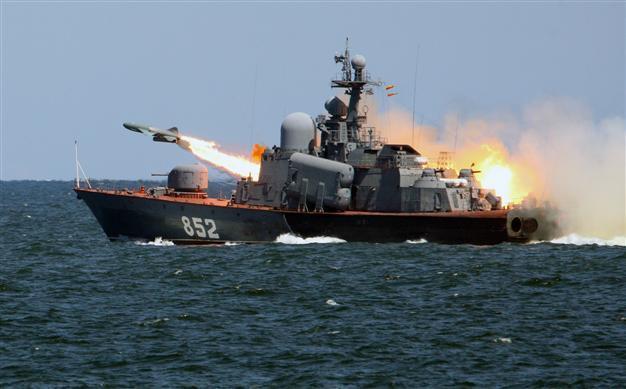China-Russia military drill in Mediterranean Sea to begin soon
ANKARA

Cihan Photo
A debut Chinese-Russian naval drill in the Mediterranean will begin soon, according to diplomatic sources, after NATO launched one of its biggest-ever anti-submarine exercises in the North Sea on May 4 amid rising tensions between Russia and its northern neighbors.“The drill will start probably next week,” one diplomatic source told Hürriyet Daily News, while responding to a question on timing on May 6, adding the starting date of the exercise may be moved back.
This will be the first time the two countries will hold military exercises together in that part of the world.
China and Russia have held naval drills in Pacific waters since 2012.
The maneuvers come as the United States ramps up military cooperation with its allies in Asia in response to China’s increasingly assertive pursuit of maritime territorial claims, Reuters said.
Tensions have run high since Russia annexed part of Ukraine last year, with the three small Baltic states, who also rely on the Nordics for defense, fearing they may be next as they are home to a large number of Russian minorities.
A total of nine ships from the two countries will participate, including vessels China now has on anti-piracy patrols in waters off Somalia, Chinese Defense Ministry spokesman Geng Yansheng told a monthly news briefing.
“The aim is to deepen both countries’ friendly and practical cooperation, and increase our navies’ ability to jointly deal with maritime security threats,” Geng said.
“What needs saying is that these exercises are not aimed at any third party and have nothing to do with the regional situation.”
Geng gave no specific date for the drills, which will be focused on navigation safety, at-sea replenishment, escort missions and live fire exercises.
Since Western powers imposed economic sanctions on Russia last year over the violence in Ukraine, Moscow has accelerated attempts to build ties with Asia, Africa and South America, as well as warming relations with its former Soviet-era allies.
China and Russia are both permanent members of the U.N. Security Council and have close diplomatic, economic and military ties, with China traditionally relying on Russia for its most advanced equipment.
Chinese President Xi Jinping is expected to visit Moscow this month to attend a parade celebrating the end of World War II.
China has been increasingly flexing its military muscles since Xi assumed the presidency in 2013, jangling nerves around the region and globally, though Beijing insists it is a force for peace and threatens nobody.
NATO launched anti-submarine exercises in the North Sea on May 4, inviting non-member Sweden for the first time.
More than a dozen vessels from 11 countries are participating in the “Dynamic Mongoose” exercise.
NATO is simulating detecting and attacking submarines in one of the most hostile seas, with rugged but shallow underwater canyons, rapid currents and unusually high sound pollution from freshwater pouring in from Norway’s fjords.
Finland detected an unidentified submarine along its coast last week, firing depth charges at the vessel, while NATO-member Latvia, a former Soviet state, last month said it detected a Russian submarine near its waters.
Russian aircraft have also repeatedly approached and even violated Nordic and Baltic airspace in recent months, challenging air defenses and triggering allied responses.
“Russia has a right to be at sea, just as we do,” Rear Admiral Brad Williamson, the commander of the exercise said. “But the incidents we have seen are not in line with international regulations... and that’s been the cause of concern.”
“This is not a response to that... but provides relevance to the exercise,” Williamson said on board the USS Vicksburg, the lead vessel in the exercise.
















